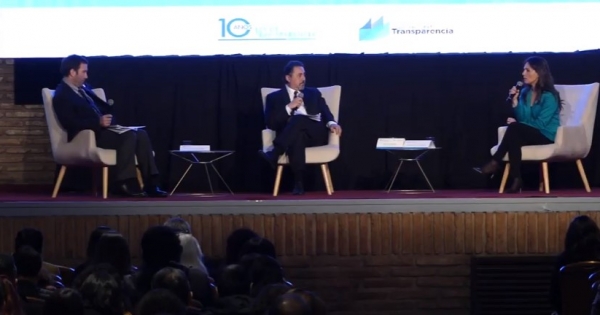
the directors of the Council for transparency (CP) LT) Gloria de la Fuente and Francisco Javier Leturia, analyzed with Héctor Cossio, editor in Chief of El Mostrador, the trajectory of the 10 years of the law on transparency and its future challenges.
The discussion was part of the seminar “10 years of the promulgation of the law: building a culture of transparency for the next decade”, inaugurated by President Sebastián Piñera and with the participation of a number of political authorities and actors social.
Panel especially highlighted 2018 participatory process organized by the CPLT, in which more than 2 thousand citizens took part of meetings developed in 16 regions of the country – including the new Region of the Ñuble-, and whose systematization served as input for the new transparency law.
On the occasion, Héctor Cossio pointed out that the trajectory of the transparency law gives an account of “maturation in the understanding of the values of transparency and the idea of tackling corruption”. He recognized that while it has made progress, there is still a climate of distrust and people also demand more transparency to the private world.
Of the source, for his part, said that “there is a significant step forward”, but at the same time instruments in legal terms should be much closer to the citizens. “Every time there are more people making use of access to the information, but the mechanism of protection, when the CPLT was used when they refuse you information, has certainly elitist bias, and is also much more male than female,” he said.
In summary, Leturia responded that “progress in these 10 years, but the happiest day of the Council for transparency will be when people claim not, when publishing information should be like brushing your teeth, when not necessary to remind someone that you have qu and do it,”said.
It should be noted that on the occasion, the President signed the new draft law of transparency that christened 2.0, which sets more stringent transparency rules for entities such as the National Congress, the Constitutional Court, the public prosecutor’s Office, the Comptroller General of the Republic, among others, and he also considers raising the reserve of nearly 200 “secret laws”.
“There is a very organized civil society opinion. Worth making a participatory process as that did in the Council for transparency, because much of what is collected in this Bill are things that we were told throughout the country”, he stressed the source.
"El reclamo puede ser genuino, pero construido sobre una mentira", apuntó el presidente Javier Milei…
El gobernador de la provincia de Buenos Aires, Axel Kicillof, encabezó un acto en Ensenada…
El diputado nacional de La Libertad Avanza, José Luis Espert, expresó su confianza en la…
Tras la masiva reaparición de Cristina Fernández de Kirchner, el presidente Javier Milei apuntó contra…
El principal propósito de la nueva comisión es evaluar los recursos humanos en el Senado,…
En una medida que busca redefinir las condiciones de los seguros de automóviles en Argentina,…
Esta web usa cookies.